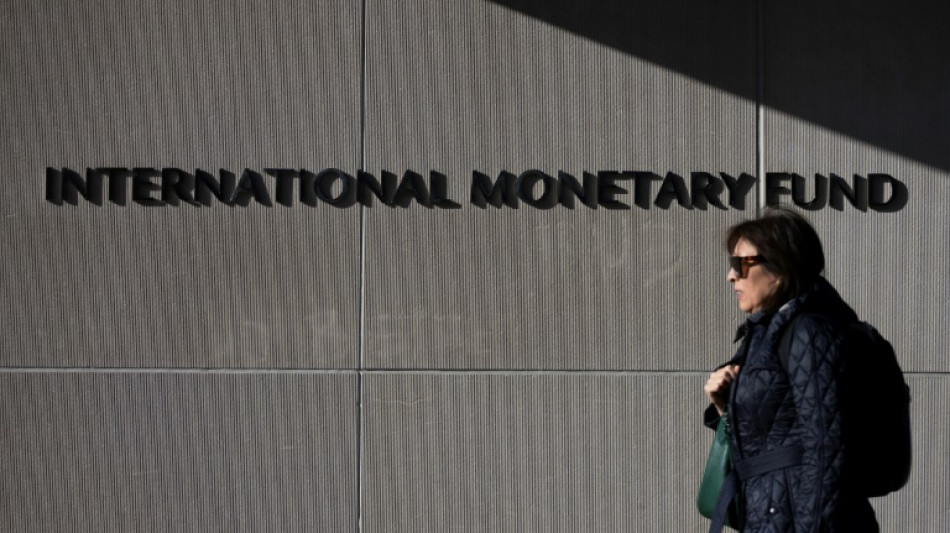
-
 Death toll from northwest China floods rises to 13
Death toll from northwest China floods rises to 13
-
Greeks count cost of wildfire 'tragedy' near Athens

-
 Historic Spanish mosque-cathedral reopens after blaze
Historic Spanish mosque-cathedral reopens after blaze
-
Massive French wildfire contained but 'not under control'

-
 Sesko completes Manchester United's new-look forward line-up
Sesko completes Manchester United's new-look forward line-up
-
Manchester United sign forward Benjamin Sesko: club

-
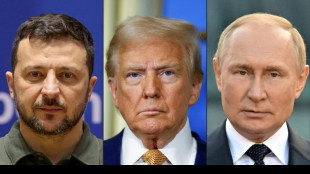 Kyiv won't give up land, says Zelensky as US-Russia summit confirmed
Kyiv won't give up land, says Zelensky as US-Russia summit confirmed
-
Kyiv won't give up land, says Zelensky as US-Russia confirm summit
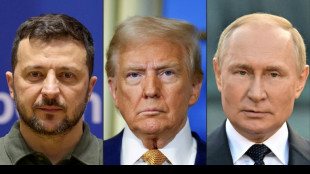
-
 North Korea removing border loudspeakers: Seoul military
North Korea removing border loudspeakers: Seoul military
-
Gunman kills police officer near Atlanta CDC headquarters

-
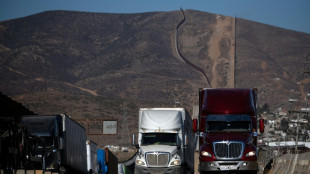 Mexico discounts risk of 'invasion' after Trump order to target cartels
Mexico discounts risk of 'invasion' after Trump order to target cartels
-
Nawaz sparks Pakistan to five-wicket ODI win over West Indies

-
 Lions' Norris hospitalized after scary injury, NFL pre-season game suspended
Lions' Norris hospitalized after scary injury, NFL pre-season game suspended
-
Restored Nagasaki bell rings in 80 years since A-bomb

-
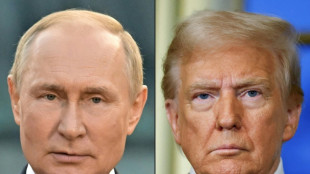 Putin-Trump summit: what we know so far
Putin-Trump summit: what we know so far
-
Australia settle on Marsh and Head as T20 openers

-
 New York declares total war on prolific rat population
New York declares total war on prolific rat population
-
Patriots unveil statue honoring iconic quarterback Tom Brady

-
 Slot's new-look Liverpool under the spotlight in Community Shield
Slot's new-look Liverpool under the spotlight in Community Shield
-
Five astronauts leave space station for trip back to Earth

-
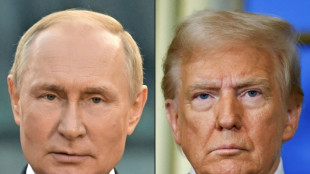 Trump and Putin to meet in Alaska next Friday
Trump and Putin to meet in Alaska next Friday
-
NBA to open season with blockbuster showdowns: report

-
 Brazil's Lula vetoes parts of environmental 'devastation bill'
Brazil's Lula vetoes parts of environmental 'devastation bill'
-
Trump says Armenia, Azerbaijan commit to end fighting 'forever'
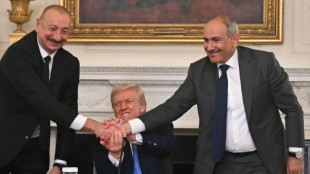
-
 Toronto champion Shelton to start Cincy against Argentine outsider
Toronto champion Shelton to start Cincy against Argentine outsider
-
US astronaut Jim Lovell, commander of Apollo 13, dead at 97

-
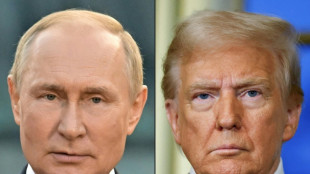 Trump says to meet Putin next Friday in Alaska
Trump says to meet Putin next Friday in Alaska
-
Fire extinguished, historic mosque-cathedral in southern Spain 'saved'

-
 Trump demands $1bn from University of California over UCLA protests
Trump demands $1bn from University of California over UCLA protests
-
Fire contained, historic mosque-cathedral in southern Spain 'saved'

-
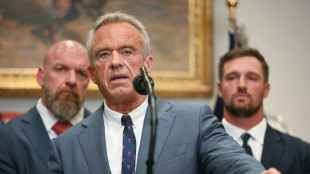 US health chief based vaccine cuts on misinformation, researchers say
US health chief based vaccine cuts on misinformation, researchers say
-
US astronaut Jim Lovell, commander of imperiled Apollo 13, dead at 97

-
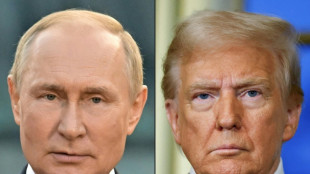 Trump says will meet with Putin 'very shortly'
Trump says will meet with Putin 'very shortly'
-
Barcelona reinstate Ter Stegen as captain

-
 Fleetwood leads St. Jude in search of first US PGA Tour title
Fleetwood leads St. Jude in search of first US PGA Tour title
-
Gold futures hit record on US tariff shock; mixed day for stocks

-
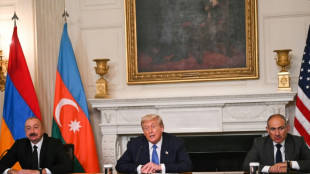 Trump says Armenia, Azerbaijan committed to end fighting 'forever'
Trump says Armenia, Azerbaijan committed to end fighting 'forever'
-
England's injured Woakes still has Ashes hopes

-
 US astronaut Jim Lovell, Apollo 13 commander, dead at 97
US astronaut Jim Lovell, Apollo 13 commander, dead at 97
-
Swiss gold refining sector stung by US tariffs

-
 New Instagram location sharing feature sparks privacy fears
New Instagram location sharing feature sparks privacy fears
-
Spain's Badosa withdraws from US Open

-
 Mexico seeks compensation from Adidas in cultural appropriation row
Mexico seeks compensation from Adidas in cultural appropriation row
-
NBA Celtics sign Mazzulla to coaching contract extension

-
 Swiss gold refining sector hits US tariff mine
Swiss gold refining sector hits US tariff mine
-
Ter Stegen responds after Barcelona strips him of captaincy

-
 Chelsea's Broja joins Burnley on five-year deal
Chelsea's Broja joins Burnley on five-year deal
-
Three centurions as 'ruthless' New Zealand pile on runs against Zimbabwe

-
 Three die in Greece as gales stoke fires, disrupt ferries
Three die in Greece as gales stoke fires, disrupt ferries
-
ICC unseals Libya war crimes warrant for militia officer

| SCU | 0% | 12.72 | $ | |
| CMSD | 0.25% | 23.58 | $ | |
| BCC | -1.34% | 82.09 | $ | |
| NGG | -1.51% | 71.01 | $ | |
| RIO | 1.76% | 61.86 | $ | |
| AZN | -0.69% | 73.55 | $ | |
| CMSC | 0.39% | 23.05 | $ | |
| GSK | 0.58% | 37.8 | $ | |
| JRI | 0.19% | 13.435 | $ | |
| BCE | 2.34% | 24.35 | $ | |
| BTI | 0.96% | 57.24 | $ | |
| RELX | -2.2% | 48 | $ | |
| RYCEF | -0.14% | 14.42 | $ | |
| VOD | 0.88% | 11.36 | $ | |
| BP | -0.15% | 34.14 | $ | |
| SCS | -0.76% | 15.88 | $ | |
| RBGPF | 1.7% | 73.08 | $ |

IMF warns of 'intensified' risks to public finances amid US trade war
Donald Trump's tariff plans have increased the risks to public finances, the International Monetary Fund said Wednesday, warning countries to get their spending plans under control and prepare for "sharper" trade-offs.
The US president's on-again, off-again introduction of levies against top trading partners has sent market volatility soaring and unnerved investors, who are attempting to chart a path through the increased uncertainty.
Over the past six months, "global economic prospects have significantly deteriorated, and risks to the economic output are elevated and tilted to the downside" Vitor Gaspar, the head of the IMF's Fiscal Affairs department, told reporters on Wednesday at the launch of the Fund's Fiscal Monitor report.
The forecast for public finances was published as part of the Fund and the World Bank's Spring Meetings of global financial leaders currently under way in Washington.
Under its new projections, which incorporate some -- but not all -- of the recently announced tariffs, the IMF now expects global general government debt to rise to more than 95 percent of economic output this year, and to approach 100 percent of GDP by 2030.
In the forecasts, the IMF expects public debt to rise by about the same amount as the combined increases seen in 2023 and 2024, Gaspar told AFP in an interview ahead of the report's publication.
"There is a pronounced trend in public debt around the world," he said.
- 'Heightened uncertainty' -
The IMF warned in its report that the "heightened uncertainty" about tariffs and economic policy, combined with rising bond yields in major economies, widening spreads in emerging markets, foreign aid cuts, and increased defense spending in Europe had all complicated the global debt outlook.
"Fiscal policy now faces a sharper trade-off between reducing debt, building buffers against uncertainties and accommodating spending pressures, all amidst weaker growth prospects, higher financing costs, and heightened risks," it added.
While public spending levels may pose political challenges, the right policy can also "be a source of confidence and support in potentially very demanding macroeconomic circumstances," Gaspar told AFP.
"Communities may be severely affected by trade dislocations, and targeted and temporary support... could be a way forward," he added.
- Different paths -
The IMF expects that more than a third of the world's economies, who collectively account for 75 percent of global GDP, will see a rise in indebtedness this year.
This includes many of the world's largest economies, including the United States, China, Germany, Britain, and France.
But these countries will face very different realities when it comes to handling that debt, Gaspar said in the interview.
"Both China and the United States are continental economies," he said. "They have a space that other economies don't have."
"The United States has an ample set of options, both on the revenue side and on the spending side, that it can deploy to control the deficit, stabilize the level of public debt and decrease the level of public debt, if it chooses to do so," he added.
"How it's going to happen depends on... the choices made in the context of the US political system," he said.
For China, Gaspar noted that the authorities would "eventually" need to tackle its public debt, but should focus their attention at this moment in time on providing targeted support to transform the economy.
"Fiscal support in China is welcome right now," he said. "It is something that helps rebalancing China growth towards the domestic economy."
"By doing so, it helps reduce the external imbalance."
M.AbuKhalil--SF-PST
